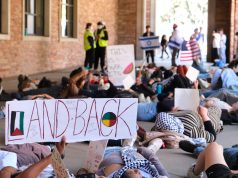Military planes stopped flying critically injured Haitians to
“These are the sickest of the sick and we can’t care for them either on the ground in
on Saturday. “We all agree they need to be medivac-ed out, but all
medivacs by the armed forces have been stopped and Homeland Security
will not give us paroles for the people.
“We have hospitals waiting to receive them. But at
the highest level of the U.S. government, they can’t seem to get them
out. And this is really not what America is all about.”
The controversy surfaced after Gov.
Crist warned that
Friday, Maj.
that “the places they were being taken, without being specific, were
not willing to continue to receive those patients without a different
arrangement being worked out by the government to pay for the care.”
Not so, said Dr.
Although “there hasn’t been a well-defined plan to
pay for uninsured people … we are still willing to take people even
if we don’t know who is going to pay,” O’Neill said Saturday. He said
UM doctors in
He estimated that the treatment for about 50 patients brought to JMH’s Ryder Trauma Center would range from
per patient and called the dustup between the state and the feds “a
little bit of a power contest … to see who will blink first.”
Private planes still can carry
He and a spokesperson for
Saturday, Navy Capt.
has temporarily suspended air medical evacuation flights regarding
Haitian nationals. The capability exists to resume those flights at any
time.
“It comes down to this: U.S. Transportation Command
cannot do an air evacuation medical mission without an accepting
medical hospital on the other end. And some states are unwilling to
approve patients’ entry for follow-on medical care, as I understand it,
because of some issues regarding reimbursement.
“Bringing them to the continental
But
“I have been active in this effort since the
beginning,” Caldwell said in an e-mail to association members on
Friday. “At no time have I heard any hospital in
say that they wouldn’t take a Haitian earthquake survivor because of
financial reasons. On the contrary. At every point along the way the
healthcare industry has been advised to rigorously document their
expenses associated with the care provided to these unfortunate
patients and that efforts were underway to determine financial
responsibility.
“At no time did any hospital say, ‘Don’t send any more to us because we aren’t getting paid!’ “
He said that “about 60 percent of the hospitals in
Crist insists he neither asked for a halt to the flights nor suggested it.
During a
street-festival breakfast on Saturday, Crist said that his letter to
HHS was intended to make clear that “we need help from our federal
friends.
is really bearing the brunt of this, and we’re happy to do that, but if
our sister states and the federal government could help — that was the
intent.”
It was not, he continued, “to stop anything. We’re humanitarians.”
He said that Secretary of
According to
“They are getting care in their country. There’s the
USNS Comfort, our U.S. medical facilities ashore, and we’re giving them
the best care we can possibly provide.”
The ship, however, is at capacity and unable to accept new cases.
Since the quake, he said,
—
(c) 2010, The Miami Herald.
Visit
Distributed by McClatchy-Tribune Information Services.














































